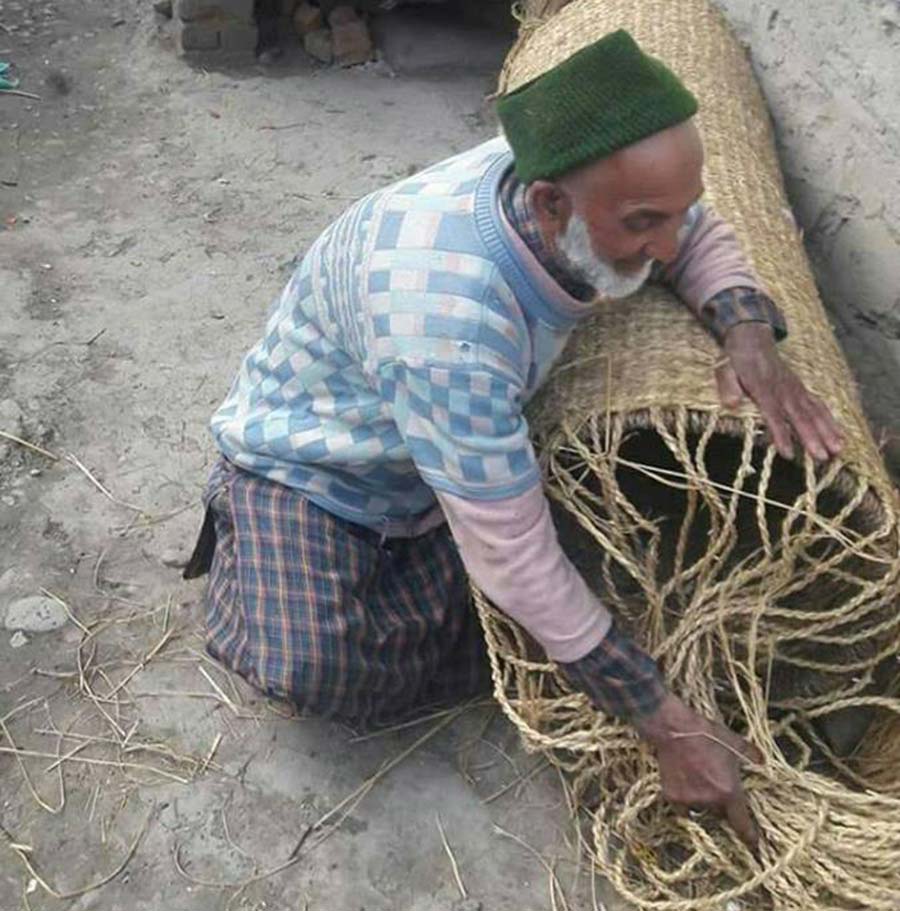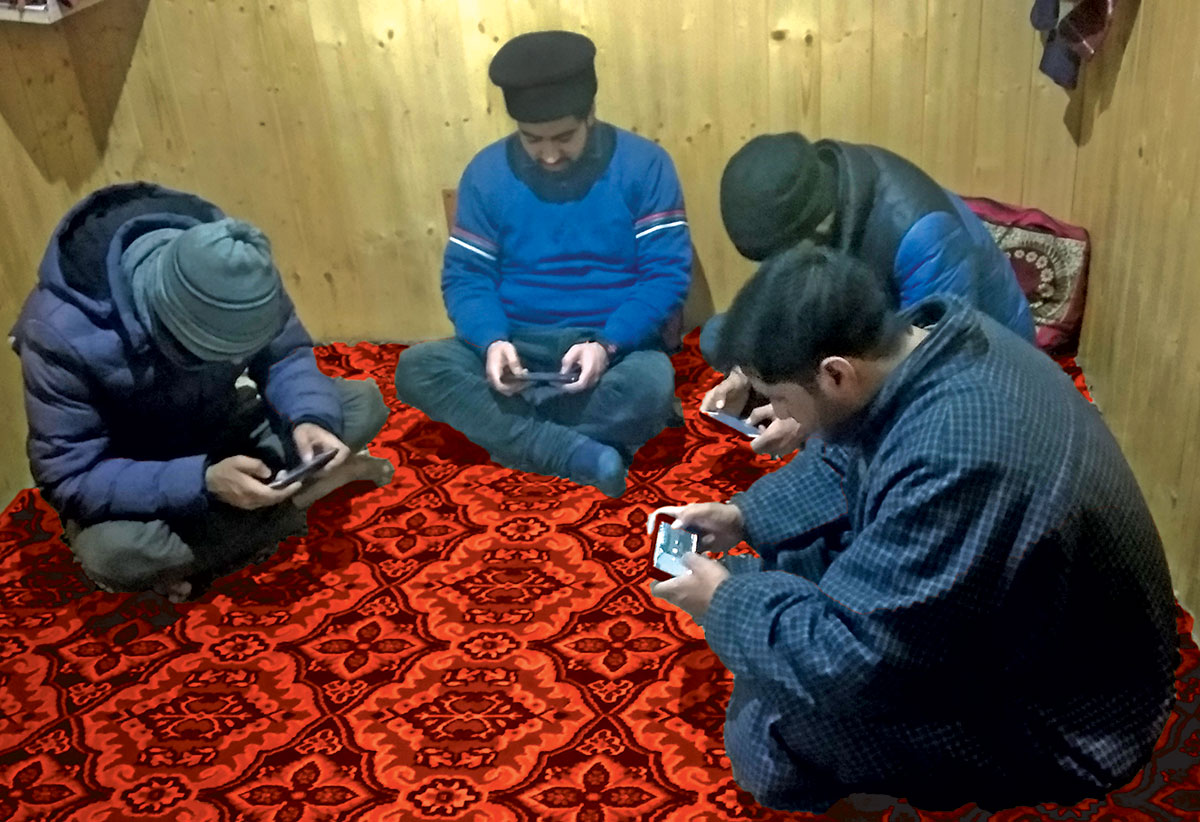As the global village gradually shrunk to a smartphone, the people in the interesting times ruled by the information technology, created their own spaces of debate, discussion, interest and concern and it is a thriving change, a Kashmir Life report

Faizan and Kamran were schoolmates till their careers took different directions. Now in their mid-thirties, Faizan is an engineer in Bangalore and Kamran teaches in Srinagar. When Faizan comes home for holidays, they meet.
Their meetings usually go beyond hi hello. Every meeting gets them back into memory lanes, nostalgia and they talk for hours: how they mixed their winter tuitions with politics and cricket. These meetings are usually long but never finish. Once back to their jobs, they pick up the threads of their meeting on the social websites and walk the talk.
The information revolution has now changed the world and the global village is literally accessible through smartphones. The social networking websites have gradually expanded to the extent that now Yarbal has gone online.
Part of the folklore and history, Yarbal was to women and Wan-eh- Pyaend was to men. Yarbal refers to the routine gathering of women of a locality on the Ghats on Jhelum or on the banks of the streams and rivulets where from women would fetch water for the kitchens. This spot was usually the source of social exchange, information, gossip and a spot where they would give went to the tensions. This was exactly what the men would do in diffris’, the group, while sitting on Wan-eh-Peanjs (plural of Pyaend in the Kashmiri language), in the shop-fronts, or the village peripheries or, in certain cases, in mosque Hamams and Nayed-Wauns, hair-cutting saloons.
Tapped water had already marked the beginning of the end of the Yarbal. The pollution in water bodies had taken its collapse a little further. The advent of satellite TV had added to the women flexibility in moving out because they would somehow relate to one or the other character in the soap operas being telecast round the clock.
It is in this backdrop that the IT-enabled cell phones have started filling the gap. It may not have actually revived the Yarbal but it has enabled men and women being part of the larger world.
Now every social networking site – Facebook, Twitter, Instagram is a Yarabal and a Wan-eh-Pyaend in its own right. The only difference is that unlike past, they connect with people they know and, in most of the cases, they do not know.
Various people have created their own interest groups on the social websites. Common interest groups are so common and now even communities and families have their groups, restricted to interactions and a common cause. Some families having its members working in different locations have created a family WhatsApp group that helped them share details of their well-being and activities on real-time basis. “I have told my son to record a video and push it, the moment he reaches his office,” one middle-aged woman, whose son has started, working in a private company in Delhi, said. “It gives me enough of satisfaction that he is all right.”
One such group on Facebook Kirkat Pyaend has been made to cater the people who want to talk and discuss cricket.
“Indeed, when we chose to name it as Kirkat Pyaend somewhere the thought of shop-front (Waane Pyaend) crossed the mind.” Gowhar Geelani, the administrator of the group said. “It is an apolitical group created by cricket lovers.”
Its 800 members are spread across cotenants. Members have different favourite teams but they agree to disagree. They use emoji of love, anger, sadness, joy and many more. “Had this agreement been on the road, it could sometimes trigger a mess but not in the group,” one of the members said.
The culture loving people who once used to travel roam around and record culture activities for personal and societal memories are now getting into the virtual space. Culture de Kashmir, one such group created in 2010 has more than 6k likes.
“The page was created with an intention to provide a space to those who are keen to talk about the Kashmiri culture,” said administrator of the page.
The page attracted Kashmiri diaspora to converge on a single page to discuss and debate different aspects of the culture they belong to. “Though virtually the online system has made it possible to bring people closer, it misses the real feel that once existed.”
Now women are also using the same space to create their corners of discussion and mutual interest. “Kashmir: Women’s Collaborative is an initiative of conscientious women who feel the need to restructure, reshape and reconstruct women’s voice and action in Kashmiri society,” declares one such page that has 1200 members, interestingly most of them, men. “This first-ever initiative brings women professionals, students and activists together to engage on the issues facing Kashmiri women today”
Another group called Kashmir Women’s Collective says the platform is “to share, to vent out, to fume and to build support and compassion from that anger, to channelize that passion for helping each other and the women of Kashmir, also the whole region of Jammu and Kashmir.”
The trend has been picked up by the generation next. Give Facebook search engine a village name and scores of groups will emerge. There are some villages that have people working in diverse fields and locations, some even abroad. They are using this group to stay connected and share information about well being and problems. These groups massively continued in the relief and rescue operations after the internet connectivity got restored.
Tarzoo Kashmir, for instance, offers details of the village and shares the news and the problems that the village faces. Zaloora Sopore is another page with more than 2k followers and it offers a blend of multi-media about the village, its people, crafts, individuals and the events. Last time when an aged Kashmir Pandit woman died, the page was literally offering every single detail from pictures to the videos of the last rites. Interestingly, a member of the group had conducted and posted a long interview with the woman, months before she died, last year.
It offers a local outlet for the talents of the village. It even posts, advertisements about the recruitments. Strictly following the Western media model, it even posts deaths in the village.
Its recent photograph shows the solar lights being installed in the village. Prior to that, there was an interesting post: “Traders Federation Sopore, Civil Society Sopore, Anjuman Moinul Islam Sopore. It is time to get united. Govt is looking for an alternate land for Central University. And we have enough in Seer Jagir Sopore. If we will not be able to strike a deal now, we will never get an opportunity to do something good for our neglected town. Central University can change the shape of Sopore in all respects.”















